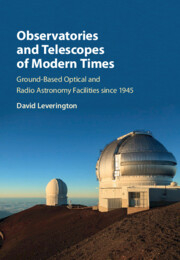 Observatories and Telescopes of Modern Times
Observatories and Telescopes of Modern Times Book contents
- Frontmatter
- Contents
- Preface
- Part 1 Optical Observatories
- Part 2 Radio Observatories
- 16 Australian Radio Observatories
- 17 Cambridge Mullard Radio Observatory
- 18 Jodrell Bank
- 19 Early Radio Observatories Away from the Australian–British Axis
- 20 The American National Radio Astronomy Observatory
- 21 Owens Valley and Mauna Kea
- 22 Further North and Central American Observatories
- 23 Further European and Asian Radio Observatories
- 24 ALMA and the South Pole
- Name Index
- Optical/ Infrared Observatory and Telescope Index
- Radio Observatory and Telescope Index
- General Index
- References
18 - Jodrell Bank
from Part 2 - Radio Observatories
Published online by Cambridge University Press: 15 December 2016
- Frontmatter
- Contents
- Preface
- Part 1 Optical Observatories
- Part 2 Radio Observatories
- 16 Australian Radio Observatories
- 17 Cambridge Mullard Radio Observatory
- 18 Jodrell Bank
- 19 Early Radio Observatories Away from the Australian–British Axis
- 20 The American National Radio Astronomy Observatory
- 21 Owens Valley and Mauna Kea
- 22 Further North and Central American Observatories
- 23 Further European and Asian Radio Observatories
- 24 ALMA and the South Pole
- Name Index
- Optical/ Infrared Observatory and Telescope Index
- Radio Observatory and Telescope Index
- General Index
- References
Summary
From Radar to Radio Astronomy
Bernard Lovell had begun his investigations into cosmic rays in 1937 at the University of Manchester in the UK where P.M.S. (Patrick) Blackett was professor of physics.(1) But two years later, at the outbreak of the Second World War, Lovell was posted to an operational radar station which was assigned to track enemy aircraft. Shortly after arriving he noticed that, in addition to observing reflections from aircraft, there were numerous short-lived echoes which the radar operators attributed to the ionosphere. Lovell wondered what the cause of these signals could be, and suggested to Blackett that they may be being produced by radar reflections from the ionisation produced by highly energetic cosmic ray showers. But the exigencies of war stopped him from investigating them further.
Lovell returned to Manchester immediately the war with the intension of investigating the transient radar echoes. To do this he borrowed an army 4.2 m wavelength mobile radar with a Yagi antenna that had been used to detect V2 rockets.(2) He immediately set up the system outside the university's physics department in the middle of Manchester. There, unfortunately, any radar signals were completely overwhelmed by interference from electric trams that ran nearby. Clearly a quiet location outside the city was required. Lovell considered a number of options before settling on a plot of land at Jodrell Bank about 25 miles (40 km) south of Manchester that belonged to the university's Botanical Gardens. He was given permission to locate his equipment there for a few weeks in December 1945.
Amazingly, Lovell observed several short-lived radar echoes from various distances on his first day of observations.(3) This was repeated on the next two days but, instead of the expected one or two echoes per day, he was detecting several per hour. This led Blackett to wonder whether Lovell was really detecting echoes caused by cosmic ray ionization or whether the echoes were caused by some other effect. So he suggested that Lovell should go to see Stanley Hey, who had experience with using the V2 detection equipment during the war, as he must also have detected these short-lived signals.
- Type
- Chapter
- Information
- Observatories and Telescopes of Modern TimesGround-Based Optical and Radio Astronomy Facilities since 1945, pp. 304 - 325Publisher: Cambridge University PressPrint publication year: 2016


